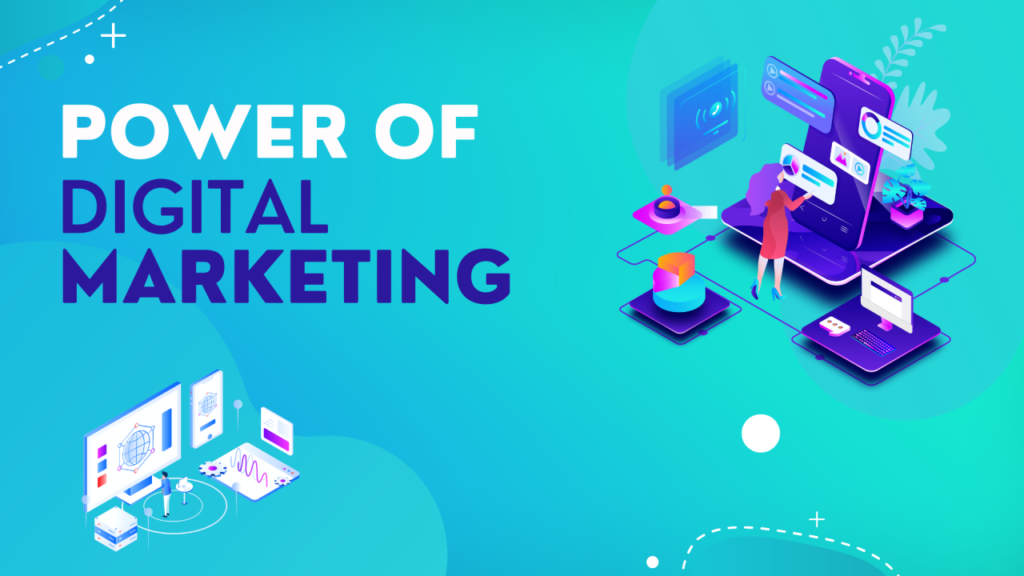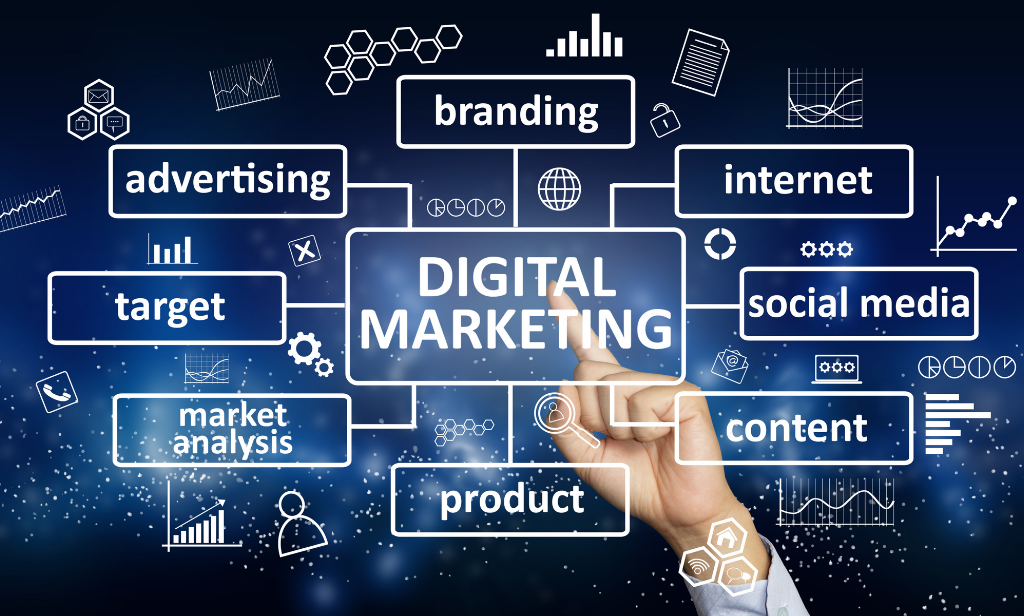How Digital Marketing Works
Understanding How Digital Marketing Works for Business Growth

In today’s competitive world, businesses must adapt to digital marketing to stay relevant and achieve sustainable growth. Digital marketing encompasses various online strategies that help companies reach their target audience, boost brand awareness, and drive sales. This blog explores the power of digital marketing, how it works, and the best practices to maximize its effectiveness.
The Power of Digital Marketing: How It Grows Your Business
Digital marketing is a game-changer for businesses, allowing them to connect with potential customers worldwide. Unlike traditional marketing, which relies on print, radio, and television ads, digital marketing leverages online channels such as search engines, social media, and email campaigns. With the right approach, businesses can achieve higher engagement, generate leads, and increase revenue.

How Digital Marketing Works: Strategies for Business Success
To harness the power of digital marketing, businesses must implement the right strategies. Some effective digital marketing techniques include: Search Engine Optimization (SEO): Optimizing content to rank higher on search engines. Pay-Per-Click (PPC) Advertising: Running paid campaigns for instant visibility. Content Marketing: Creating valuable blog posts, videos, and infographics. Social Media Marketing: Engaging with customers on platforms like Facebook, Instagram, and LinkedIn. Email Marketing: Nurturing leads and maintaining customer relationships.
Boost Your Business: How Digital Marketing Works Effectively A well-planned digital marketing strategy enhances brand reputation and customer trust. Businesses must focus on data-driven decision-making, audience targeting, and consistent content creation to maximize their digital presence. Analytics tools like Google Analytics and social media insights help track performance and optimize strategies for better results.
Step-by-Step Guide:
How Digital Marketing Works for Growth Define Your Goals: Identify what you want to achieve, such as brand awareness or lead generation. Know Your Audience: Research customer demographics, interests, and online behavior. Choose the Right Channels: Focus on platforms where your audience is active. Create Quality Content: Develop informative and engaging content. Implement SEO Strategies: Optimize content for search engines. Monitor & Optimize: Use analytics to track performance and make necessary improvements. Maximizing Business Success: How Digital Marketing Works
To achieve long-term success, businesses must continuously optimize their digital marketing strategies. Using automation tools, A/B testing, and customer feedback helps refine campaigns for better performance. Staying updated with industry trends also ensures businesses remain competitive.
Digital marketing has become essential for businesses aiming to thrive in the digital age. It involves leveraging online platforms and technologies to connect with target audiences, enhance brand visibility, and drive sales. As of 2025, several emerging trends are shaping the digital marketing landscape:
1. Artificial Intelligence (AI) Integration:
AI is revolutionizing digital marketing by enabling personalized customer experiences and data-driven decision-making. Tools powered by AI automate ad placements and targeting, enhancing efficiency and return on investment. However, some marketers express concerns over limited transparency and control with these AI-driven tools.
2. Personalized Marketing Strategies:
Utilizing data analytics, businesses can deliver individualized messages and product recommendations, fostering deeper customer engagement and loyalty. This approach involves understanding customer preferences and tailoring content to meet their specific needs. Lorem ipsum dolor sit amet, consectetur adipiscing elit. Ut elit tellus, luctus nec ullamcorper mattis, pulvinar dapibus leo.
Add Your Heading Text Here
Partnering with influencers allows brands to reach broader audiences authentically. For instance, Unilever plans to increase its investment in social media influencers to address consumer skepticism towards traditional advertising.
4. Omnichannel Marketing:
Ensuring a seamless customer experience across various platforms—online and offline—is crucial. Luxury brands, in particular, are adopting omnichannel strategies to adapt to changing consumer behaviors and economic challenges.
5. AI in Ad Buying:
AI-driven tools are increasingly automating ad buying processes, optimizing ad placements, and targeting, leading to more efficient campaigns. Despite their effectiveness, some marketers have reservations about the lack of transparency and control associated with these AI tools.
6. AI-Driven Content Optimization:
Artificial Intelligence Optimization (AIO) focuses on enhancing AI-generated content for better visibility and engagement. This involves prompt optimization, content refinement, and ensuring alignment with search engine algorithms to improve ranking and reach.

Benefits of Digital Marketing for Business Growth:
Global Reach: Digital marketing enables businesses to connect with a global audience, breaking geographical barriers and expanding market reach.
Cost-Effectiveness: Compared to traditional marketing methods, digital marketing offers more affordable options with measurable results, allowing for better allocation of marketing budgets.
Data-Driven Decisions: Utilizing analytics tools provides insights into customer behavior and campaign performance, facilitating informed decision-making and strategy adjustments.
Enhanced Customer Engagement: Interactive platforms and personalized content foster stronger relationships with customers, leading to increased loyalty and lifetime value.


Key Digital Marketing Strategies for Business Growth:
Search Engine Optimization (SEO): Optimizing your website and content for search engines increases organic traffic, making it easier for potential customers to find your business online.
Pay-Per-Click (PPC) Advertising: Running targeted PPC campaigns on platforms like Google Ads provides immediate visibility and drives qualified leads to your website.
Content Marketing: Creating valuable and informative content, such as blogs, videos, and infographics, engages your audience and positions your brand as an industry authority.
Social Media Marketing: Engaging with customers on social media platforms like Facebook, Instagram, and LinkedIn fosters community building and enhances brand loyalty.
Email Marketing: Nurturing leads and maintaining customer relationships through personalized email campaigns can lead to increased conversions and repeat business.
Influencer Marketing: Collaborating with influencers allows brands to reach broader audiences authentically. For instance, Unilever plans to increase its investment in social media influencers to address consumer skepticism towards traditional advertising.
Growth Hacking Techniques: Implementing innovative, low-cost strategies focused on rapid growth can significantly boost user acquisition and engagement. Growth hacking involves continuous experimentation and optimization to identify the most effective tactics for scaling your business.
Mastering Digital Marketing: Tips, Trends, and Strategies for Success
In the ever-evolving world of digital marketing, staying ahead of the curve is essential. Whether you’re a small business owner or a seasoned marketer, understanding the latest trends and strategies can make a big difference. In this blog, we’ll explore key elements of digital marketing, actionable tips, and the tools that will help you succeed.
1. The Basics of Digital Marketing
Digital marketing refers to all marketing efforts that utilize the internet or an electronic device. This includes a wide range of tactics and strategies such as:
- Search Engine Optimization (SEO)
Improve your website’s visibility on search engines to increase organic traffic. - Social Media Marketing
Build your brand and engage with customers across platforms like Instagram, Facebook, Twitter, and LinkedIn. - Content Marketing
Create valuable, relevant content to attract and retain a clearly defined audience. - Email Marketing
Use email to nurture relationships with customers and drive conversions. - Pay-Per-Click Advertising (PPC)
Paid campaigns on Google, Facebook, and other platforms to get targeted traffic.
2. The Power of SEO: Best Practices and Tools
SEO is one of the most effective ways to drive organic traffic to your website. Here are some key strategies to implement:
- Keyword Research: Use tools like Google Keyword Planner and Ahrefs to find keywords your target audience is searching for.
- On-Page SEO: Optimize title tags, meta descriptions, and images.
- Backlink Building: Focus on acquiring high-quality backlinks from authoritative websites.
- User Experience (UX): A fast, easy-to-navigate website keeps users engaged, which improves rankings.
Tools for SEO:
- Google Analytics
- SEMrush
- Moz Pro
3. Social Media Marketing Trends
Social media platforms are powerful marketing tools for businesses of all sizes. Some tips for success on social media include:
- Create Engaging Content: Use videos, infographics, and polls to engage your audience.
- Consistency is Key: Maintain a regular posting schedule.
- Leverage Influencers: Partner with influencers in your niche to boost credibility and reach.
- Analyze Your Data: Use insights from platforms like Facebook Insights and Instagram Analytics to improve your strategy.
Emerging Trends in Social Media:
- Short-form video content (TikTok, Instagram Reels).
- Social commerce (buying directly on platforms like Instagram).
- Augmented Reality (AR) for virtual try-ons and experiences.
4. Content Marketing: The Heart of Digital Marketing
Content is still king. Here’s how you can optimize your content marketing efforts:
- Blog Posts: Provide in-depth, informative articles on topics relevant to your audience.
- Video Content: Invest in video as it increases engagement and shares.
- Infographics and Ebooks: These visually appealing content pieces can be shared and downloaded for lead generation.
- User-Generated Content (UGC): Encourage your customers to create content for your brand. This boosts trust and authenticity.
Content Marketing Tools:
- HubSpot
- BuzzSumo
- Grammarly (for error-free content)
Email Marketing: Nurturing Leads and Building Relationships
Email marketing is an effective way to stay in touch with potential and current customers. Some tips to improve your email marketing strategy:
- Segmentation: Segment your email list to send more personalized messages.
- Engaging Subject Lines: Create compelling subject lines that increase open rates.
- A/B Testing: Experiment with different subject lines, email designs, and calls to action.
- Automation: Use email automation tools to send timely and relevant messages.
Email Marketing Platforms:
- Mailchimp
- ConvertKit
- ActiveCampaign
Advanced Strategies in Digital Marketing
Once you’ve mastered the basics of digital marketing, it’s time to explore more advanced strategies that can give your business a competitive edge:
A. Artificial Intelligence (AI) and Machine Learning
AI is changing the way businesses approach marketing. From personalization to predictive analytics, AI can automate tasks, improve customer targeting, and even assist in content creation. Here’s how AI can be used in digital marketing:
- Chatbots: Automate customer support and lead generation with AI-powered chatbots that provide instant responses to customer queries.
- Predictive Analytics: Leverage AI to analyze data trends and predict future consumer behavior, helping you plan your marketing campaigns more effectively.
- Personalization: AI allows for a deeper level of content and product recommendations, creating more personalized experiences for your customers.
B. Voice Search Optimization
With the rise of voice-activated devices like Amazon Echo, Google Home, and Siri, optimizing for voice search is becoming increasingly important. Voice searches are often longer and more conversational, so your SEO strategy should reflect that:
- Focus on Long-Tail Keywords: Voice searches tend to be more natural and longer than typed queries, so focus on targeting long-tail keywords.
- Optimize for Local SEO: Many voice searches are location-based, so ensure your website is optimized for local SEO to capture traffic from voice searches near you.
Influencer Marketing: Partnering with the Right Influencers
Influencer marketing continues to be a powerful tool in digital marketing. It helps businesses reach a wider audience, build trust, and drive conversions. Here’s how you can make the most of influencer marketing:
A. Choose the Right Influencers
Not all influencers are the same. The key is to find the right influencers who align with your brand values and have a genuine connection with their audience. Consider the following:
- Micro-Influencers: Micro-influencers (those with smaller, highly engaged followings) can be more cost-effective and offer a more authentic connection with their audience.
- Niche Influencers: Partnering with influencers in your niche (whether it’s beauty, fitness, food, etc.) can ensure your products or services reach the most relevant audience.
B. Set Clear Goals and Expectations
Before collaborating with an influencer, define your goals. Do you want to increase brand awareness, drive sales, or promote a specific product? Make sure to set clear expectations on content delivery, compensation, and usage rights.
